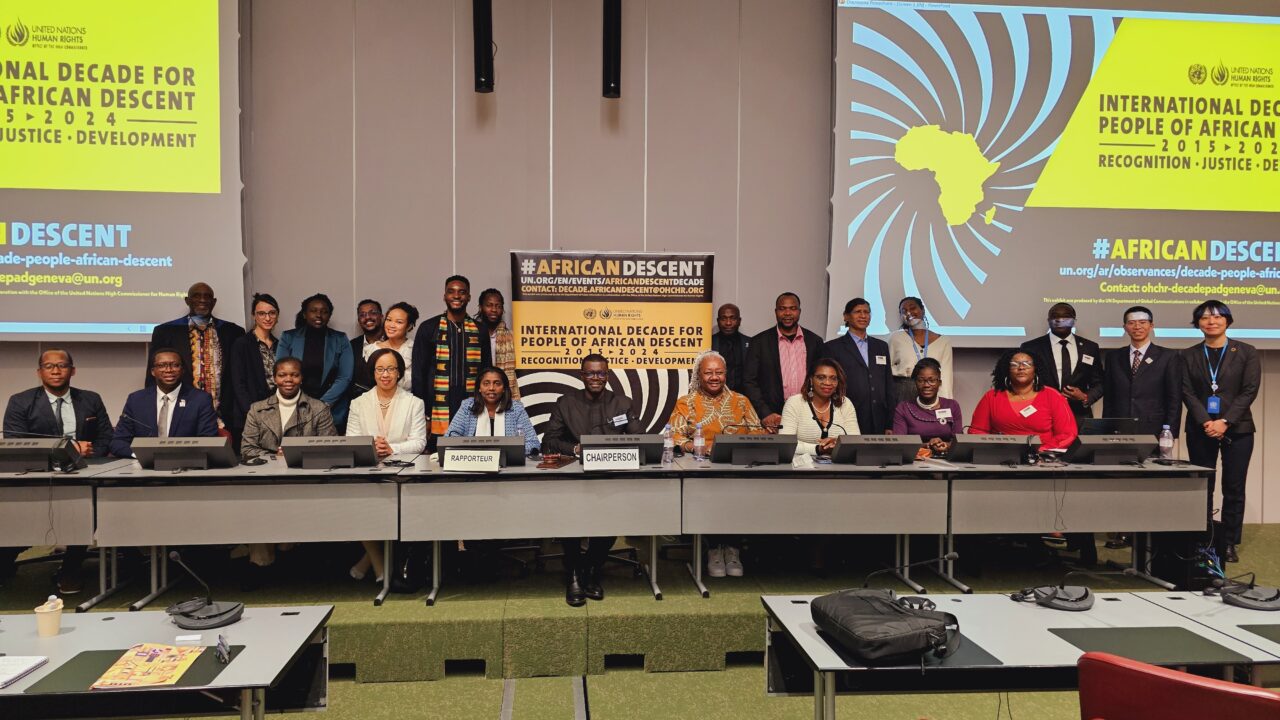
International Decade for People of African Descent
Systemic Racism and Exclusion in Australia
16th January 2024
I’d like to start by acknowledging the traditional custodianship of the part of Australia where I live and predominantly work, the land of the Whadjuck people of the Nyoongar nation. I pay respect to elders past and present and extend this respect to Elder Waskam who is with us here today, as well as anyone in our midst or us joining online who may be of Aboriginal and or Torres Strait Islander heritage. I acknowledge that sovereignty never ceded, and I stand in solidarity for the ongoing struggle for recognition, truth-telling and justice.
I want to firstly highlight the fact that Australia is a colonial settler state, whose foundations are based on the dispossession of Aboriginal and Torres Strait Islander people from their lands. This colonial legacy has and continues to shape every wave of migration, including that of people of African descent.
People of African descent are impacted by Australia’s settler-colonial past, its White Australia immigration policy, which ended in policy in 1973, and its enduring legacy that characterises the lives of First Nations peoples, including Aboriginal people, Torres Strait Islanders, and South Sea Islanders. People of African descent experience a culture of denial of Australia’s black and brutal colonial past. A past that has shaped the foundations of systems and structures such as education, justice, and health just to name a few.
I believe that until the inherent dignity of Aboriginal and Torres Strait Islander people is recognised and respected, people of African descent stand no chance because the roots of Australia’s foundation is anti-blackness.
With that said, I would like to focus on the broader issue of systemic racism and its impact on people of African descent living in Australia.
Systemic Racism
Black Africans in Australia live at the intersections of a dual reality of invisibility and hypervisibility. I would like to highlight the incredible body of work by my sister Associate Professor Kathomi Gatwiri from Southern Cross University, who has published extensively on Afrodiasporic experiences in Australia and who has also written on this duality and the way in which it characterises experiences of belonging or lack thereof.
Racism and discrimination are social determinants of health that influence quality of life. People of African descent, and I’m speaking specifically of black Africans, are subject to racial discrimination in all spheres of society which impact access to health, employment, justice, education, and housing. Despite having ratified the Convention on the Elimination of All Forms of Racial Discrimination 1966 (CERD) in 1975 and the launching the Racial Discrimination Act in the same year, one person is yet to be charged under the Act.
Australia prides itself as a melting pot of cultures, but this pride quickly turns into hostility when confronting racism experienced by black Africans.
The mainstream Australian media has a legacy of negatively portraying people of African descent in a racist manner. Racist media portrayal of Africans as criminals (African Gangs) has also contributed to an escalation of social exclusion across all spheres of life in Australia. Much of this damage, a “political tactic” deployed in the wake of the 2018 elections, predominantly depicting people of South Sudanese backgrounds as criminal. This led to a slew of racist media propaganda which trickled down to everyday experiences at the grassroots. Media coverage of people African descent often portrays us in a negative light, highlighting crime while simultaneously failing to project the positive contributions of Africans in Australia.
The community fought back with the hashtag #AfricanGangs, a social media campaign spearheaded by Maker Mayek, a Melbourne based Litigation Lawyer and Principal Solicitor. This campaign which made headlines globally, shining a light on the sensational media of crime statistics, and profiling of individuals from African communities.
More recently, Channel 7 published a racist social media post about England players who missed penalties in the Euro 2020 final – before swiftly deleting it after a fierce backlash. The post read “Three Black players failed in the penalty shootout which England lost 3-2 against Italy”. This quote was accompanied by one of the black players leaning forward covering his face. This highlights the reality of anti-blackness as a universal issue. For people of African descent, whether residing on the continent, in the United States, in Asia Pacific or any part of the world, systemic racism remains a pervasive reality.
